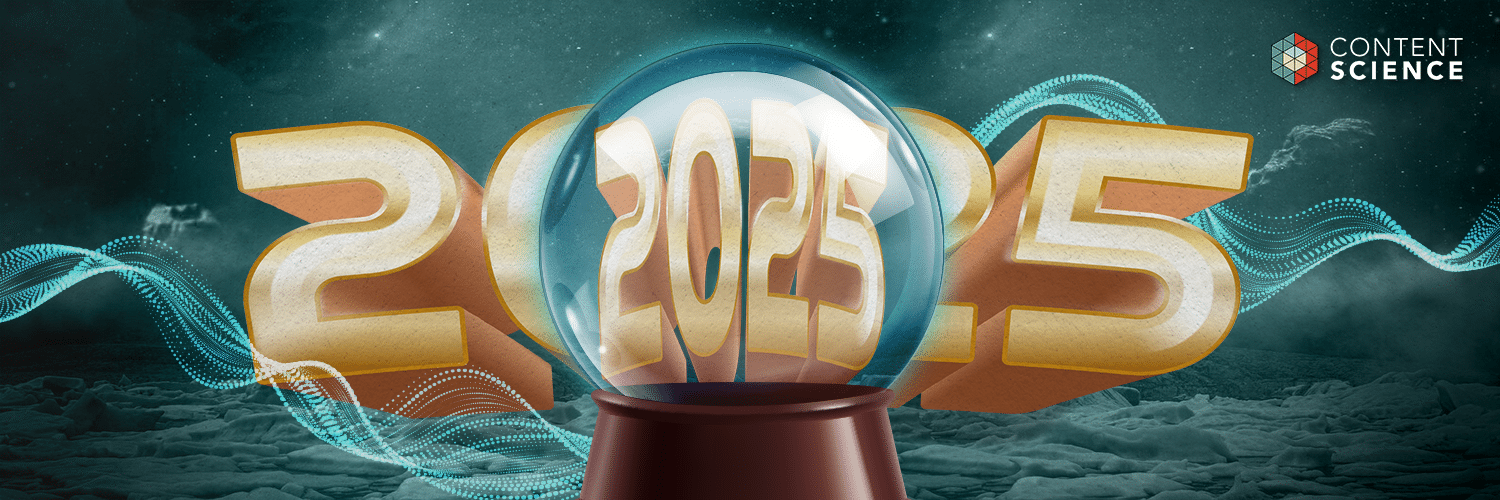
Our era of trending toward disruptions and extremes continued in 2024, filled with opportunities and challenges for every company and organization.
To adapt and thrive, content professionals and leaders with content responsibilities sought to mature their content operations, embrace the potential of artificial intelligence (AI) while sidestepping the pitfalls, and take an integrated, end-to-end approach to support the full customer experience.
Now 2025 is here, and so are our annual content predictions and plans. We curated quotes from both the new third edition of The Content Advantage and from new recent conversations. Don’t miss these insights as you anticipate what the year holds.
Governance Considerations for Investing in AI
Cory Bennett, Senior Director, Sallie Mae
AI won’t govern itself – yet …
While AI is still an often misunderstood or misused buzzword, its use in corporations and with individual users is growing at exponential rates. But with great power comes great responsibility. Deploying AI without proper governance can lead to serving inaccurate, irrelevant, and even harmful content. Just as you wouldn’t publish human-created content without a second set of eyes, spell check, or other checks and balances, you want to have similar measures in place to ensure you’re publishing what best represents your brand.
An Integrated + Structured Approach to Personalization
Timi Stoop-Alcala, Principal Content Strategist, IKEA
My guiding question for 2025: How might we mature our ways of working to effectively weave content strategy, content engineering, content design, and knowledge modeling into content operations and product development?
Personalization has always aimed to deliver relevant content, but we now need to reimagine how to provide “the content that matters, when it matters” to foster customer agency and build trust. Achieving this at scale requires transforming our content practices—structuring content like data and modeling it as knowledge to ensure it’s both machine-readable and meaningful to humans. This semantic foundation is crucial for developing holistic content intelligence used by decisioning engines and other systems that consume content. Organizations must embed structured knowledge practices into omnichannel content development and empower content leaders within product and strategy teams. This ensures content is fit for automation, omnichannel delivery, explainable personalization, and AI training.
More Research on Effective Use of AI
Christopher Jones, PhD, Vice President, Content Science
Our understanding of how to most effectively use AI for content creation and workflows will continue to improve in the next year. We will see more research on how we (humans) can collaborate effectively and responsibly with AI. We can hope the research will improve the awareness and transparency on the limitations of AI, the value of high quality content, and the best practices for governance.
Closing Equity Gaps in Health Literacy
Juviza Rodriguez, Sr Director of Consumer Health, March of Dimes 
Healthy People 2030, a set of public health objectives, emphasizes the importance of organizational health literacy as a strategy for helping close equity gaps. At its core, this is a call to action for organizations to prioritize making information clear and actionable for everyone. In the context of maternal-infant health, effective content strategies that incorporate plain and inclusive language are essential. By developing culturally sensitive and easily understandable materials, organizations empower expectant mothers to navigate their health decisions confidently, and as a result have great potential in improving outcomes and fostering equity across diverse populations.
AI Further Disrupts Content in Organic Search
Greg Vilines, Chief Product Officer, Terminal
In 2025, AI is going to significantly influence content as an acquisition channel through organic search. Google has integrated AI results directly into its search. ChatGPT surpassed 300 million weekly users in December of 2024, and more and more users are thinking of AI tools as their default answer engine.
This will result in massive changes to the inbound value of content. Surface-level “definitional” content has already gone to Google’s AI results (glossaries, “what is a <blank>”, etc.). And chatbots are now a destination for more complicated learning content. Imagine a search like “workout plan for 40 year olds”…Google used to be the first place you’d turn to find content like this NY Times article about adapting your workouts when you hit 40. Now ChatGPT can create a custom workout plan just for you in seconds. Content as an acquisition tool will still have value, especially as the value of real connection in social channels and trust in experts stays strong. But organic search is going to see a seismic reinvention over the next few years.
Leaders Measure Content Early and Often
Laura Barnes, Sr Director of Global Content, Red Hat
If you’re in a leadership position in content, it’s critical to connect your team’s work to marketing’s measurement strategy—early and often. In fact, content teams can sit in many places in an organization, and—in my opinion—one of those places could be aligned to a data and analytics team that functions to serve users/customers/prospects. More than ever, content has to be differentiated, opinionated, intentional, accessible, and measurable. And data/user research can tell you if you’re doing a good job here. It’s easy to get caught up in internal messaging strategy, politics, or org charts so much so that we’re not clear on content’s role. Set goals for your content, measure it, refine it, and repeat. That’s the way to get your team focused and to prove its value to the rest of the business.
Organization-Wide AI Adoption Slows for Strategy
Colleen Jones, President, Content Science; Author, The Content Advantage 
If I had to give organization-wide adoption of deep learning (generative) AI a movie title, it would be Slow and Slower. Although individual adoption has accelerated at breakneck speed, enterprise-wide adoption has not. As only one of many examples, concerns about accuracy have led many in the manufacturing industry to decelerate AI initiatives. Smart enterprises will shift from reacting to gen AI hype to responding strategically, so 2025 is a great opportunity for leaders with content responsibilities.
It’s time to do more than get training in prompting AI. It’s time to advocate for modern content skills like content engineering; to insist on maturing content operations; to close gaps in an end-to-end content approach; and to get clear on the risks posed by deep learning AI so your team becomes the solution to minimizing those risks—and maximizing the rewards.
More Content Research for Confident CX
Erica Jorgensen, Author, Strategic Content Design
Content research continues to be essential to content strategists, content designers, really anyone who wants to feel confident about their customer experiences ideally before launch, to ensure the content experience is as clear, usable, and engaging as it can possibly be. You often don’t know whether your word choices are clear to your audience unless you directly ask them.
Embracing Content Systems Beyond the CMS
Michael Haggerty-Villa, Director of Content Strategy, Teradata
I put a stake in the ground and declared that content systems—in addition to content design and technical documentation—are one of our foundational content pillars. Yes, we need to modernize and streamline our content management system. But our focus on systems is even broader than that.
AI Drives Enterprise Interest in Content Engineering + Content Operations
John Collins, Senior Content Engineer, Atlassian
There’s been a lot of interest in content strategy for almost 20 years, which is great, but that strategy can’t come to life at scale without content engineering and content operations. Both have historically been under-appreciated, but I’m excited to see growing interest in content engineering and content operations from enterprises and from the content world. Both will be crucial to optimizing content for artificial intelligence and for integrating it into content workflows and the content lifecycle.
Content Operations Maturity Informs Technology Choices
 Carrie Hane, Co-Author, Designing Connected Content
Carrie Hane, Co-Author, Designing Connected Content
Organizations frequently make decisions about content production or technology without understanding their content operations maturity level. They want the outcomes of mature operations but are at the lower maturity level. This discrepancy leads to unmet expectations and unwarranted blame.
When it comes to choosing content technology, it is critical to understand your content operations maturity level. Often, technology is expected to fix what are actually people and process issues. It is crucial to assess who is producing the content and the processes they follow for publishing and governance before choosing the technology to support them.
Stay tuned to Content Science Review and sign up for our newsletters to get more content insights, strategies, and updates throughout the year.
Events, Resources, + More
The Ultimate Guide to End-to-End Content
Discover why + how an end-to-end approach is critical in the age of AI with this comprehensive white paper.
The Content Advantage Book
The much-anticipated third edition of the highly rated book by Colleen Jones is available at book retailers worldwide. Learn more!
20 Signs of a Content Problem in a High-Stakes Initiative
Use this white paper to diagnose the problem so you can achieve the right solution faster.
Upskill with Content Science Academy
Training for modern content roles through on-demand certifications + courses or live workshops.


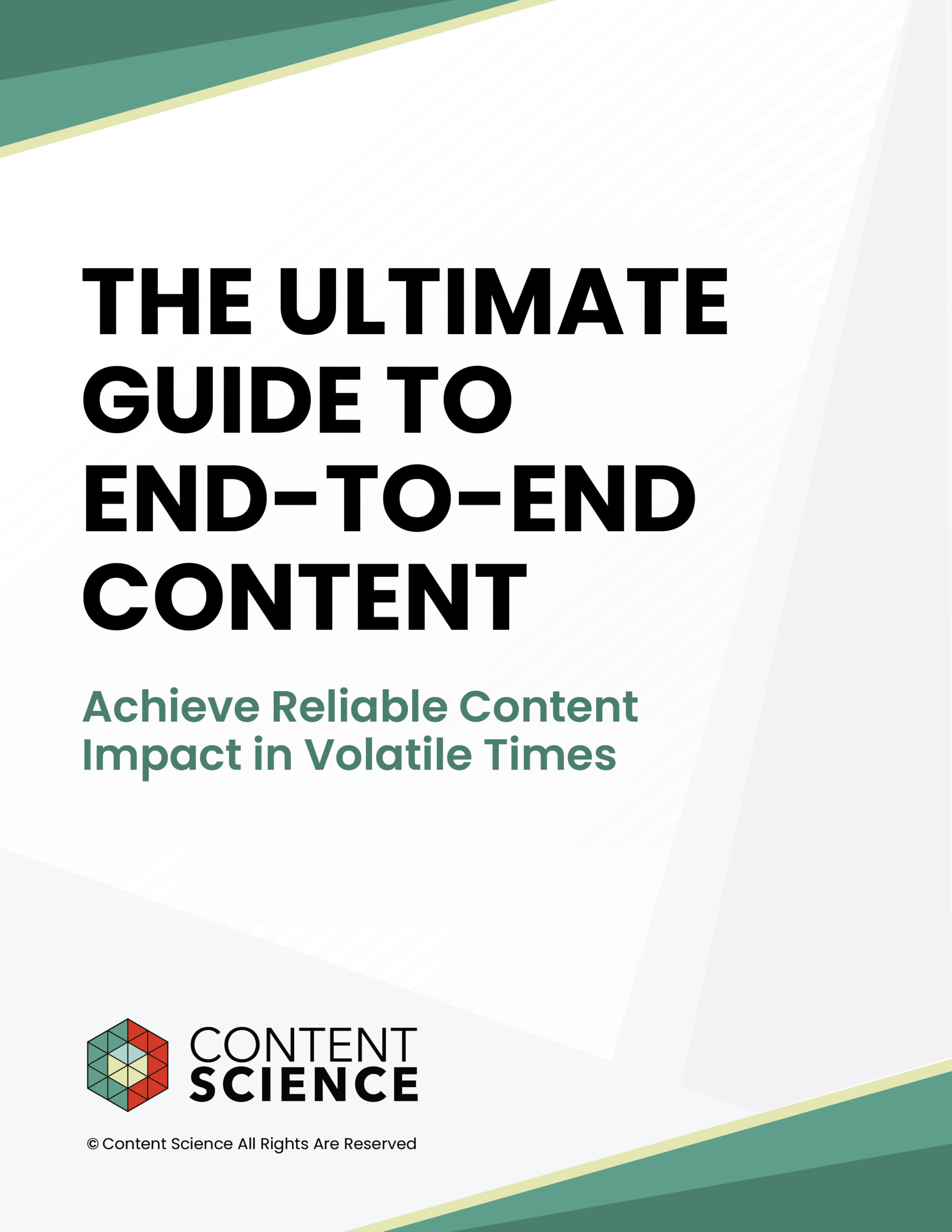
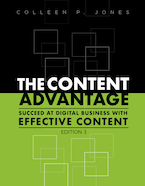
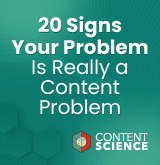
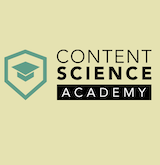
Comments
We invite you to share your perspective in a constructive way. To comment, please sign in or register. Our moderating team will review all comments and may edit them for clarity. Our team also may delete comments that are off-topic or disrespectful. All postings become the property of
Content Science Review.